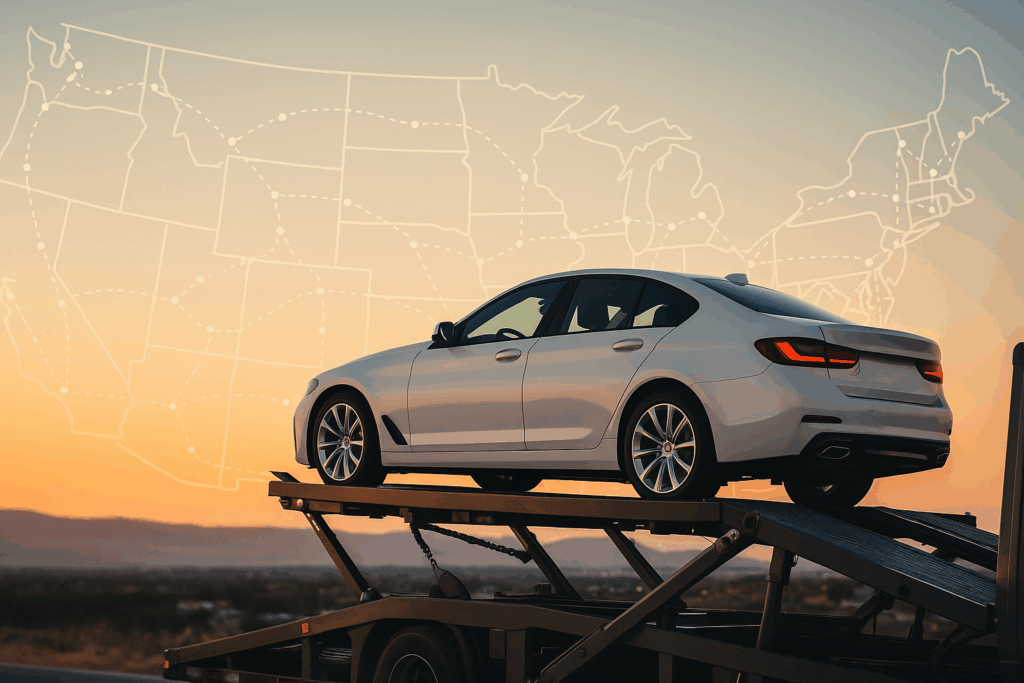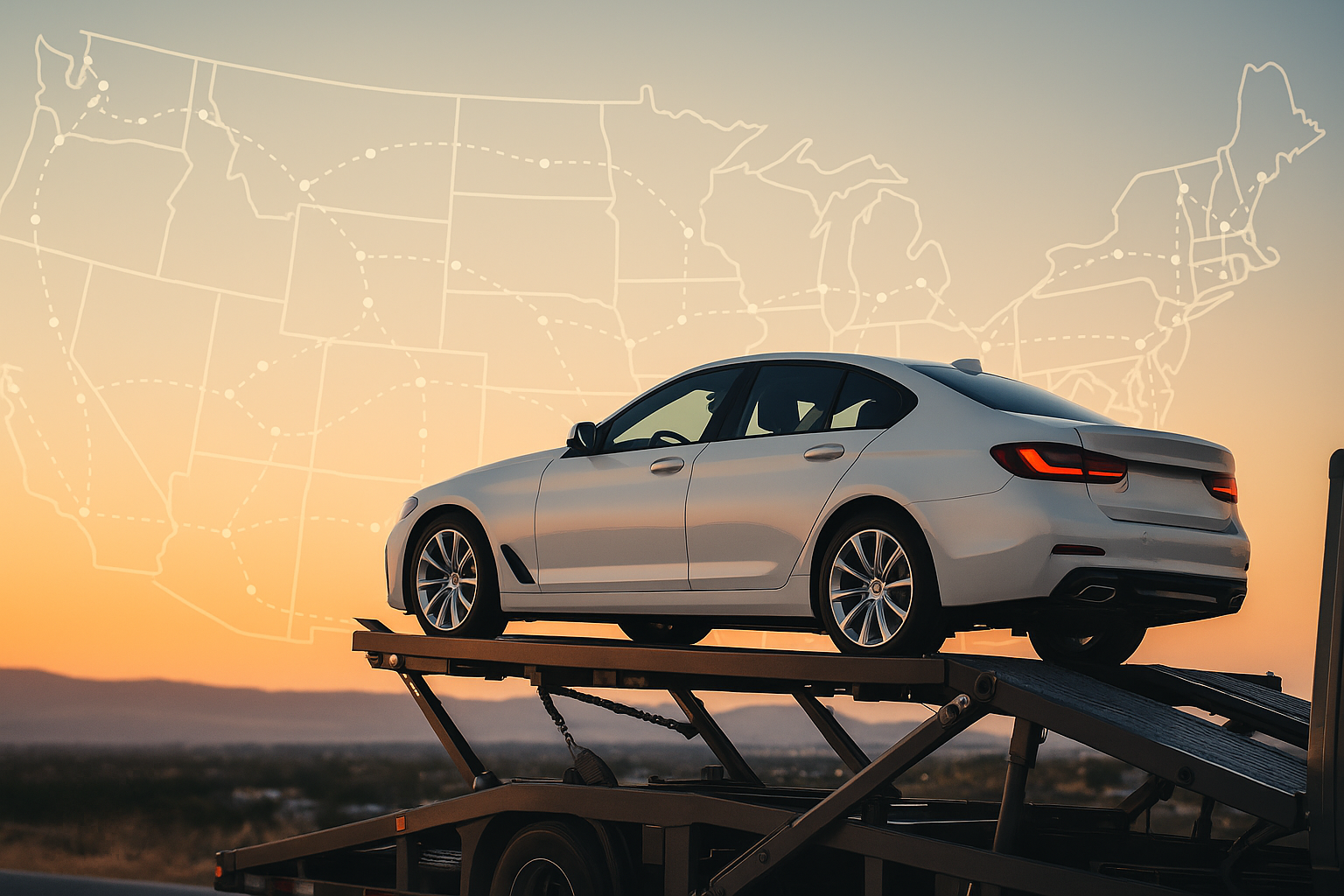Introduction
The cost of driving your car cross-country in 2025 isn’t just about filling up the tank. It’s a complex equation of rising fuel prices, unpredictable maintenance expenses, wear and tear, lodging costs, and the time you lose behind the wheel. While cross-country road trips used to be a rite of passage, today they come with logistical, financial, and even environmental trade-offs.
As inflation continues to impact travel-related costs and vehicle maintenance becomes more expensive, many people are reconsidering whether it’s worth the stress and expense of driving long distances. You might think, “It’s cheaper to just drive it myself,” but when you start calculating actual expenses—gas, oil changes, tire wear, meals, hotels, and the potential cost of breakdowns—it quickly adds up. Not to mention, putting thousands of extra miles on your car can seriously reduce its resale value.
That’s why a growing number of individuals and families are turning to professional car shipping services as the smarter alternative. Whether you’re relocating for work, sending a child to college, buying a car out of state, or simply heading south for the winter, shipping saves time, stress, and money in the long run.
In this blog, we’ll break down the real cost of driving your car cross-country in 2025, compare it with professional shipping, and help you determine the best option for your budget, lifestyle, and vehicle. Spoiler alert: the numbers may surprise you.

The DIY Drive: What It Really Costs in 2025
Driving from one coast to another can feel like an adventure, but it’s not free—especially in today’s economy. Let’s discuss the cost of driving your car cross-country:
1. Fuel Prices Are Still Unstable
- Average gas price in 2025: $4.15/gallon (and rising in many states)
- Driving 2,800 miles (e.g., LA to NYC) in a car that gets 28 MPG = 100 gallons
- Fuel cost: ~$415 – $550, depending on your route and car
2. Lodging and Meals
- 4–5 days on the road (assuming 8–10 hrs of driving/day)
- Budget hotels: $80–$150/night
- Food: $40–$60/day per person
- Total: $500 – $900
3. Time Off Work
- Even if you’re salaried, you may use up PTO or lose freelance income
- If you earn $300/day, that’s $1,200–$1,500 in lost time
4. Wear and Tear
- Oil change, tire wear, added miles = long-term depreciation
- Risk of breakdowns or accidents
- Estimated maintenance impact: $300 – $700
🧾 Estimated Total DIY Cost: $2,500 – $3,500 (not including stress or risk)
What Does It Cost to Ship a Car Cross-Country?
Car shipping is more convenient—and often, surprisingly affordable.
Average Cross-Country Shipping Costs in 2025:
| Type of Vehicle | Open Transport | Enclosed Transport |
| Standard Sedan | $1,100 – $1,400 | $1,500 – $1,900 |
| SUV or Pickup | $1,300 – $1,700 | $1,800 – $2,300 |
| Classic/Luxury Car | N/A | $2,000 – $2,800 |
🧾 Shipping Average: $1,200 – $2,000 depending on distance, vehicle, and carrier
The Hidden Benefits of Shipping Your Car
✅ Save Time & Energy
No long drives, no hotel stops, no traffic—your car arrives while you fly.
✅ Avoid Depreciation
You skip putting 2,000–3,000 extra miles on your odometer, which helps maintain resale value.
✅ Peace of Mind
Professional shippers handle insurance, safety checks, and tracking. No breakdowns or road surprises.
✅ Budget-Friendly Options
Open carriers are a great value for reliable everyday vehicles. You can save even more if your schedule is flexible.
Real-World Comparison: Driving vs. Shipping
| Expense Category | DIY Drive | Car Shipping (Open) |
| Fuel | $415 – $550 | Included |
| Lodging + Meals | $500 – $900 | N/A |
| Time Off Work | $1,200 – $1,500 | N/A |
| Vehicle Wear & Tear | $300 – $700 | N/A |
| Total | $2,500 – $3,500 | $1,200 – $1,400 |
Why More People Are Choosing Car Shipping in 2025
The rising cost of driving your car cross-country is one reason Americans are shifting to auto transport—but convenience, safety, and long-term value are the real drivers of this trend.
Families relocating between states find that shipping their second or third vehicle allows them to focus on packing, settling into a new home, and traveling by plane with kids or pets—without worrying about breakdowns or juggling caravans. For students heading to college, shipping the car saves them from a solo drive and ensures peace of mind for parents.
Remote workers and digital nomads, who frequently relocate between coasts, use car shipping services as part of a smarter moving plan. When your job goes wherever you do, having your vehicle delivered allows you to stay productive and reduce burnout from long-haul driving.
Many classic or luxury vehicle owners choose enclosed shipping to protect their prized rides from road debris, weather, or unexpected scratches—especially when resale value is a factor.
At MBM Logistics, we provide:
- Transparent pricing (no bait-and-switch)
- Live tracking and status updates
- Flexible pickup/drop-off windows
- Dedicated customer support that actually picks up the phone
🔗 Also read: How to Avoid Car Shipping Scams in 2025 to learn how MBM leads with trust and clarity.
Final Thoughts
In today’s economic landscape, the cost of driving your car cross-country can be a costly and exhausting endeavor. While a road trip sounds fun in theory, the reality includes fatigue, unexpected expenses, weather risks, and thousands of miles on your vehicle’s lifespan.
Shipping a car instead gives you:
- Lower stress and zero physical wear
- Financial savings on hotels, gas, and meals
- The flexibility to fly and settle in comfortably
- Reduced carbon emissions (especially if you choose consolidated carrier transport)
At MBM Logistics, our job is to make shipping as effortless as possible. We’ve helped thousands of drivers across the U.S. move their vehicles safely and affordably. Whether it’s a daily driver, a family SUV, or a high-end luxury vehicle, we tailor the service to fit your exact needs.


Leave a Reply